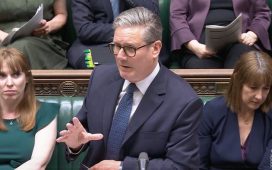The UK government is set to recoup hundreds of millions of pounds from the sale of the collapsed power supplier Bulb to Octopus Energy as long as wholesale gas prices do not rise again in the coming months.
The Whitehall financial watchdog had predicted that taxpayers could lose up to £6.5bn as a result of Bulb’s 2021 failure, which prompted the biggest state rescue of a business since the financial crisis.
The potential payback from the Octopus deal will raise hopes that the cost to taxpayers and households of Bulb’s temporary nationalisation will come in well below expectations.
The recent drop in energy prices — if it continues — would shave up to £840mn from the eventual losses, officials have estimated.
Bulb was quasi nationalised in November 2021. In December 2022, it was taken over by its larger rival Octopus in a controversial — and opaque — deal signed off by the Department for Business, Energy and Industrial Strategy following a long-running sales process that drew only one bidder. Ministers have been criticised for refusing to give the precise terms.
As part of the deal, the government agreed to lend Octopus the cost of buying energy for Bulb’s 1.5mn customers during a transition period from the date of the takeover on December 20 to March 31 this year.
The loans were intended to shield Octopus from the risk of potentially heavy losses from absorbing Bulb’s customers, as the government had not bought energy supplies for them in advance to cover the winter months.
Treasury rules had forbidden Bulb from hedging — or buying gas and power supplies in advance — during the year it was in state hands, a move that is contrary to standard industry practice.
In exchange for the government loans, Octopus agreed to make repayments to the Treasury. These were based on the cost of the wholesale component of the energy price cap, which governs how much households — including Bulb’s old customers — pay for their energy bills.
Sharp falls in the wholesale price of natural gas and electricity since the cap was last set mean Octopus’s repayments are higher than the costs to the government.
This means the Treasury stands to make a net gain of £300mn from Octopus in January or £840mn in the three months to April based on prices this week. These are snapshot figures and are highly dependent on usage and energy prices, which could rise again.
“Although the prices are currently in the Treasury’s favour, they do fluctuate wildly,” said one government figure.
Estimates of the total cost of Bulb’s rescue have varied hugely. Last month, the government said it had set an upper limit of £4.5bn but the Office for Budget Responsibility has suggested a higher potential cost of £6.5bn.
The cost of the bailout has been borne by taxpayers but the Treasury has said it will eventually be spread across almost every household’s energy bill. Households are already paying £94 each for the cost of 29 other failed energy suppliers.
Octopus has also agreed to pay the government about £200mn and to share the profit on any Bulb customers. The state loans will end on March 31 when all of the energy for Bulb’s customers will have been fully hedged by its new owners. Shell, which handles hedging for Octopus, started hedging for Bulb’s customers on December 20.
The loans are due to be paid back by 2025 — although there are incentives for early repayment — when the profit-share agreement is also due to end. The deal will make Octopus Energy the third-largest UK energy supplier behind British Gas and Eon, with 4.9mn customers.
BEIS said “ensuring that we get the best outcome for Bulb’s customers and taxpayers remains our priority”. Octopus Energy declined to comment.









